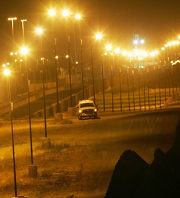Border Wall, Spanish Land Grant Collide
Bill Radke
Millie Jefferson
APRIL 19, 2008
- Border patrol near Tijuana, Mexico
- (David McNew/Getty Images)
- Enlarge This Image
Web Resources
Related Stories
- Spending the Stimulus Money
- Foreclosure Double Punch
- The End of Weekend America
- Conversations with America: Concluding the Conversation
More From Bill Radke
More From Millie Jefferson
In 2006, Congress decided to put 700 miles of fencing along the U.S. border from California to Texas. Last year, Department of Homeland Security (DHS) Secretary Michael Chertoff scaled it back to 370 miles of fencing -- meaning the fence or wall will not be continuous.
So what determines where it will stop, and where it will pick up again? The federal government hasn't said. This fence is slated to go right through the properties of many lower- and middle-class Texas residents, but not through the properties of some very wealthy Texans.
One of those residents who does stand to be walled off from some of her land is Eloisa Tamez, who lives in El Calaboz near Brownsville. She's trying to stop the DHS from dividing the three acres behind her house just north of the Rio Grande.
Bill Radke: Eloisa, welcome to Weekend America.
Eloisa Tamez: Thank you for having me.
Let's start with some history, Eloisa -- how did your family end up on the U.S.-Mexican border?
This land on which I am sitting now is part of the land grant that was given to my ancestors back in 1767. That was a land grant from the king of Spain and it was, at that time, that territory was Mexico. Our ancestors have been in that territory long before Texas was a republic, long before Texas was a state. So, we're pretty much an indigenous group of that region.
And tell us about this region, what is life like today in El Calaboz?
In El Calaboz I have many relatives that have adjoining tracks to mine. Many of them are still working the land in the same way that it was worked years back. They raise crops, corn, cabbage, but it's almost all according to the season because the land is very fertile. It's by the river's edge. The land is very fertile, you can grow just about anything. The other thing too is that they raise cows, and chickens, and hogs, sheep and goats. They just do whatever they can to make enough money to pay their taxes and so on.
What would it be like for you to have this 18-foot border wall come through your land?
Well, it's going to be very interesting, because it's not going to be just the wall that's going to go up. There's going to be highways and there's going to be a lot of lights. As the border patrol put it to me the first time they approached me, they are going to build a gate about three or four miles east of where my property is, and those of us that have land on the other side would be able to access it through this gate. One of the things I brought up to them was, I asked them if this was going to just be a gate that we could go through without any problems. And they told me, "No, you'll have to show identification." I said, "Well then it's a checkpoint." So, I am going to have to go through a checkpoint when I want to go see the other side of my land.
Eloisa, Homeland Security says this wall is important for our security and that some Americans will have to make a sacrifice. The taking of lands for national purposes has been going on a long time. Why are you fighting this?
I'm not saying that I myself am going to stop the construction of this wall. The government is much too powerful, as we see every day. And when I brought the opposition to Homeland Security, it was not about my wanting to stop the building of the wall. I cannot do it as one individual, stop that power. My litigation was to say to the government, I as an individual had a legal right to fight for my land. I know that some people say, well, you know, why would she be fighting for three acres? But you know it's not just three acres, it's what it represents -- I mean, that's the way we see it at our end.
Your ancestors' connection to this land goes back more than 200 years. What do you imagine when you think 200 or 300 years forward for what this wall might mean for the land and your family?
Well, it's going to be gone. Not only will the wildlife be destroyed, but also the indigenous peoples and cultures of this international boundary zone will be extinguished. It will no longer be the same. Are we going to be proud to say that we have built the eighth wonder of the world, and it's all in south Texas? Is that what our legacy's going to be?
Eloisa, it's been a pleasure talking to you. Thank you.
Well, thank you.
-
- Music Bridge:
- Lavender
- Artist: Alter Ego
- CD: Diamanten Und Raketen II (Klang Elektronik)







Comments
Comment | Refresh
Post a Comment: Please be civil, brief and relevant.
Email addresses are never displayed, but they are required to confirm your comments. All comments are moderated. Weekend America reserves the right to edit any comments on this site and to read them on the air if they are extra-interesting. Please read the Comment Guidelines before posting.
You must be 13 or over to submit information to American Public Media. The information entered into this form will not be used to send unsolicited email and will not be sold to a third party. For more information see Terms and Conditions and Privacy Policy.